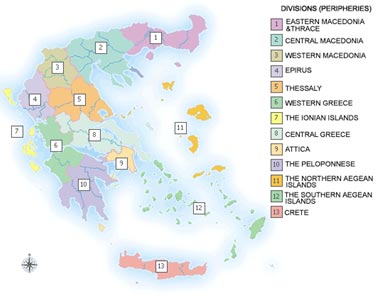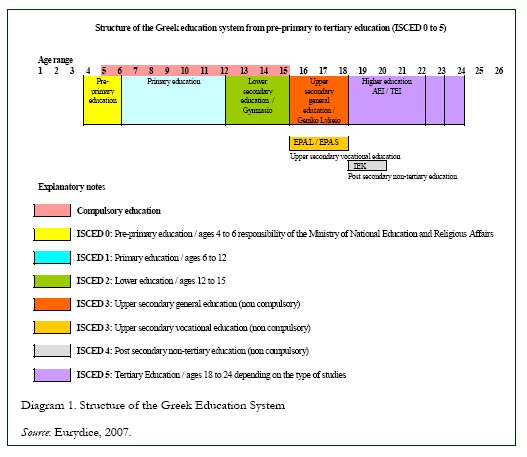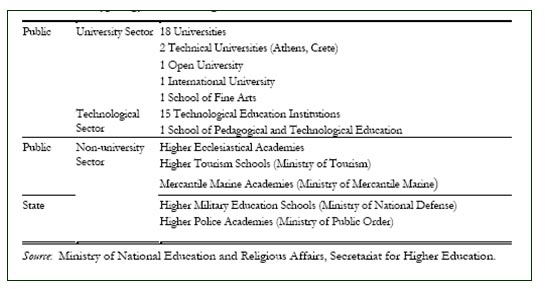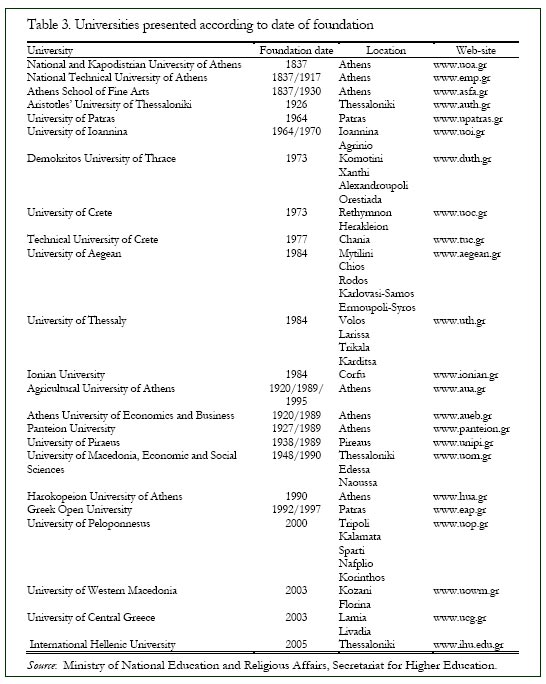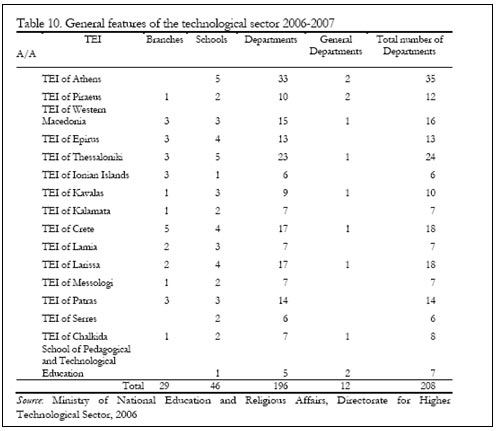Welcome to the Virtual Education Wiki ~ Open Education Wiki
Greece
Partners situated in Country
-
Country in a nutshell
GREECE (Ελλάδα – Elláda) officially the Hellenic Republic, is a country in southeastern Europe, situated on the southern end of the Balkanic Peninsula and it includes more than 2000 islands situated in Ionian and Aegean Seas and it has a total surface area of 131,957 km2. Greece is a parliamentary republic and it’s considered as the cradle of the western culture and thought. Greece is a member of the European Union since 1981, of the Economic and Monetary Union of the European Union since 2001and also a member of NATO from 1952.
Athens is the capital of Greece and Thessaloniki, Patras, Heraklion, Volos, Ioannina, Larissa e Kavala are some of the most important cities of the country.
As of January 2008, the population of Greece is estimated at 11,262,000 by Eurostat : the 58,8% lives in the urban areas and only the 28,4% in rural areas.
The official language is the Modern Greek that is spoken by the 98.5% of population; moreover, there are some Slavic and Turkish minorities.
The widespread religion is the Orthodox Christian and the relationship between State and Church are regulated by the Third Article of the Greek Constitution.
Greece is divided in 13 perifereies (περιφέρειες) – Attica, Central Greece, Central Macedonia, Crete, East Macedonia e Thrace, Epirus, Ionian Island, North Aegean, Peloponnese, South Aegean, Thessaly, West Greece, West Macedonia – subdivided into a total of fifty-one prefectures called nomos. Greece is a Parliamentary Republic thanks to the Referendum of the 8th December 1974.
The President of the Republic, who is considered the edge of the state, is elected by the Parliament for a five-years terms, only for two mandate. The Greek Constitution, formed by 120 articles, foresee the separation of the three powers: executive, legislative and judiciary. The executive power is exercised by the President of the Republic and by the Government. The President of the Republic is the commandant in chief of the armed forces and he presides over the Defense Council. The civil authority of the armed forces is the Ministry of the national defence. The President of the Republic appoints the Prime Minister and the other Cabinet members. Legislative power is exercised by a The legislative power is exercised by a 300-member elective unicameral Parliament (Vouli ton Ellinon) : elections are held every four years by universal suffrage through a complex proportional system, with barrage at 3%. The judiciary power is independent from the executive and legislative and it comprehends three Supreme Court: the Court of Cassation (Άρειος Πάγος), the Council of State (Συμβούλιο της Επικρατείας) and the Curt of Auditors (Ελεγκτικό Συνέδριο). Greece has a multiparty system, dominated by two principles political party: the liberal-conservative New Democracy (ND), actually in power, and the social-democratic Panhellenic Socialist Movement (PASOK).
Country education policy
During the 19th century, have been implemented in Greece, many reforms in the education field, in relation to the structure of the system, the national curriculum and the language used for education. In 1975 the Constitution has established the new paradigm of education legislation that was introduced through the reform of the education system, one year later, in 1976. The reform in question has established a common language for education, has reformed the education division between primary, secondary and tertiary education and emphasized the modernization of curricula and the improvement of the administration and monitoring of education. The second period of reforms of the education system began in the mid-nineties and the third period in early 21 century, between 2004 and 2006. This reform, introduced important changes, like the creation of the Foundation of International University of Greece, the reform of secondary vocational training, the introduction of a new law for the assessment of education and legislative actions in relation to lifelong learning area.
In the Greek Constitution, education is identified as a responsibility of the state. The majority of Greek citizens attend public schools, in fact, there are few private schools that are supervised by the Ministry of Education. The Minister has a centralized control on state schools, sets educational curricula, he manages the staff and monitors the funds. At regional level the role of supervisor of the Minister is done through the Regional Councils for Primary and Secondary Education that operate in every prefecture. The tertiary institutions are almost totally autonomous, even if the Minister is responsible for funding. In accordance with Article 16 of the Greek constitution, education, both moral, intellectual, occupational and physical, is a basic mission for the state, with the aim of developing a national and religion conscience and provide adequate training to the future citizens.
The basic legislation is included in the following:
- Constitution 2001 (Article16).
- Law 682/1977: “About the private schools and boarding houses”.
- Law 1566/1985: “Structure and Operation of Primary and Secondary Education and other Stipulations”.
- Law 2817/2000: “Regional Directorates of Education”.
- Law 2916/2001: “Structure of Higher Education and settlement of issues in the Technological Sector”.
- Law 2986/2002: “Organisation of Regional Services of Primary and Secondary Education, assessment of teaching task and staff, teachers’ in service training and other stipulations”.
- Law 3027/2002: “Regulations concerning the Organisation of School Buildings for Higher Education and other stipulations”.
- Ministerial Decisions 21072α/Γ2/ Official Journal 303 v.B’/13-3-2003 and 21072β/Γ2/ Official Journal 304v.B’/13-3-2003, “Cross-Curricular Thematic Framework and Curricula of Primary and Secondary Education”.
- Law 3255/2004: “Regulations for Issues of all Educational Levels”.
- Law 3369/2005: “Systematisation of Lifelong Learningand other stipulations”.
- Law 3467/2005: “Selection of primary and secondary education teachers, regulations for Administration and Education issues and other stipulations”.
- Law 3475/2006: “Organization of secondary vocational education and other provisions”.
- Law 3549/2007: “Reform of the institutional framework concerning the structure and function of the higher education institutes”.
More recently legislation interventions made in the period 2000-2001 include :
- Improvements have been made to the 1997/98 reform, regarding the access system to Higher Education and the hiring of educators. In the case of the first one notes a less rigid textbook based assessment system which exhibits features of analysis, association, critical thinking etc. in this regard one can claim that attempts are made to reach congruency between the curriculum and its contents and the assessment for access to higher education system.
- Legislation regarding the fields of Special Education, decentralisation of education, training and evaluation of educators has been reformed (Law 2986/2002).
- Technological Education Institutes have been upgraded by being incorporated in Higher Education which now consists of two parallel sectors namely: the University and the Technological ones. (Law 2916/2001).
The specific changes introduced into the education system with the Greek Reform of 2007 include: The establishment of Unified Upper Secondary School (Eniaio Lykeio) which is gradually replacing all other existing types of upper secondary school (lykeio); The procedure for admission to higher education has been changed, with emphasis on the assessment of pupils in the second and third degree of lykeio; The duration of kindergartens and primary schools has been stretched because it will gradually move to full-time; Second Chance Schools have been created specifically for teens who have already completed 18 years and have not yet completed the compulsory school; The design of a common curriculum for both primary and secondary education
A focal point of educational policy is the idea that education is a social resource and a right for every citizen. Based on laws passed by Parliament for each educational level, the State intends to render more democratic the whole process of education, decentralizing it, ensuring the participation of those who are directly involved in the process, raising the quality level provided and applying the principle of merit principle in the recruitment of specific staff . Compared to European data Greece isn’t investing many resources to fund educational projects: in fact, the percentage of GDP granted to education in 2005 was 3.98% . Also the other percentage rates are lower than the European average.
The current reform (Law 3549/2007: "Reform of the institutional framework concerning the structure and function of the higher education institutes") will be discussed extensively later, in paragraph “Higher Education Reform”.
Country education system
Education system in Greece is subdivided in 4 levels:
- Pre-primary Education: nipiagogeio (preschool);
- Primary Education: dimotiko Scholeio (primary school);
- Secondary Education: gymnasio (Lower Secondary School), geniko lykeio (General upper Secondary School), epaggelmatiko lykeio – EPAL (Vocational Lyceum/ EPA.L), TEE (Technical Vocational Schools / TEE) and epaggelmatiki scoli – EPAS (Vcational Educational Training Schools / EPAS);
- Higher Eduation: Panepistimia/AEI (University), Technologika Ekpaideftika Idrymata / TEI (Technological Education Institutes) and the School of Fine Arts (ASKT) .
The education system in Greece ranges from 6 to 16 years old and normally include the primary school (demotiko) and secondary (Gymnasio).
Pre-primary Education
Law 1566/1985 determines all the details concerning the structure and organization of primary and secondary education. The same law provides that the pre-school education depends on the primary system and in this sense follows the regulations in place for Dimotiko Scholeio (primary school). In particular, the pre-school education is provided by Nipiagogeia (Kindergartens) that operate independently or in specialized centres together with the state nursery school (children's centers). The frequency of nipiagogeio lasts 2 years and after the changes introduced in 2006, was made compulsory from 5 years of age. The issues concerning the organization of nipiagogeia are governed by decisions N° F27/148/G1/160/14-2-95 of the Minister of Education. Since 1997 has been set up full time: Oloimero nipiagogeio (All-day kindergarten) was introduced by Law 2525/97. Finally, in relation to Article 73 of Law 3518/2006, the frequency at nipiagogeio begins from 4 years of age, becoming compulsory from 5 years onwards. The nursery school (Παιδικός σταθμός, Paidikós Stathmós) starts at the age of two and a half years, in institutions both public and private. They are very popular, but attendance is not mandatory.
Primary education
Primary education is provided within the primary schools (scholeio), whether public or private. The primary schools are distributed all over the country, even in the remotest regions. Attendance is mandatory and there are no additional costs for school and for textbooks. The frequency in Dimotiko Scholeio lasts 6 years and includes levels 1, 2, 3, 4, 5 and 6. The access is possible after having completed 6 years of age. Oloimero Scholeio (All-day School) operate in parallel to the ordinary primary school, with an extended timetable and an enriched curriculum. The current primary and secondary school structure was established in 1985 with the Law 1566: this law has instituted new procedures for the designing of new curricula and textbooks. This framework has been modified and enriched with new laws and presidential decrees. There are also Idiotika nipiagogeia (private kindergartens) and idiotika scholeia operating under the responsibility of the Ministry of Education and controlled by regional administrative bodies, just as in the case of public schools. They have the same organization and structure of state schools and qualifications equivalent to those issued in public.
Secondary education
Secondary education in Greece is divided into two levels: Compulsory Education and Higher Secondary Education.
Types of Institution This subdivision describes the main types of educational institutions that are included in secondary education.
- Compulsory Secondary Education – Gymnasio
- Upper Secondary non-Compulsory Education - Geniko Lykeio
- Vocational Lyceum – EPAL (epaggelmatiko lykeio) | Vocational School – EPAS (epaggelmatiki scholi) | Technical Vocational Educational School - TEE (Technika Epangelmatika Ekpedeftiria) (secondary non-compulsory education)
- Post-Secondary non Tertiary Education – IEK (Institouta Epaggelmatikis Katartisis)
The compulsory secondary education is provided in Gymnasio, which lasts for 3 years: from 12 to 15 years of age. The upper secondary education (not compulsory) is provided through two types of institutions: Geniko lykeio (General Lyceum / GL) and epaggelmatiko lykeio - EPAL (Vocational Lyceum). The frequency in both types of school lasts 3 years. There are also epaggelmatiki Scholar - EPAS (ΕΠΑΣ / SS), professional schools, the frequency of which lasts for 2 years. With the Law 3475/2006 , it is determined that training is provided within the Vocational Lyceums (EPAL) and Vocational Schools (EPAS), which replaced the State Technical Vocational School (TEE), under the supervision of the Minister of Education and Religious Affairs. The change from the TEE to EPAL / EPAS was gradual and started in the academic year 2006-2007. The duration of the course is 3 years and is divided into 3 levels of employment: The first level includes 3 levels: I) Technology, II) Services, III) Naval; The second includes Mechanical Engineering, Electrician, Electronics, Building Works, Information Science, Economics and Management, Health and Welfare, Agronomy, Food and the Environment. The third level includes: General mechanical engineering, Car engineering, Electrical facilities, computer systems & networks electronic experts, Economics and Management employees, Tourist enterprises employees, assistant nurses, Medical & biological laboratories assistants, Pharmacy assistants, Food Technology & Control, Landscaping – Environment & Agro-tourism, Modern Business Agriculture, Merchant Marine Masters, Merchant Marine Engineers.
In addition, there are particular gymnasia and lykeia : religious, minorities, inter-cultural, music experimental and some special classes for pupils who need special education, called Secondary Special Needs Education Schools and Inclusion Classes (ΣΜΕΑ/SMEA). Other alternative secondary education are the School of Fine Arts, Sports Facilities Classes and Second Chance Schools. In state schools the attendance is free and textbooks are distributed free of charge by the state. The post-secondary education (not university) includes Epaggelmatikis Instituta Katartisis-(IEK) - Vocational Training Institutes - which offer qualifications for employment and diplomas that certify the training received. In fact, this type of institutions provides a formal professional education with the possibility to receive a Certificate or a Diploma of Vocational Training, equivalent to that of professional schools (Vocational Lyceums - EPAL). This license allows entry into the working world in both the public and the private sector. These schools accept students both from Gymnasio and Lykeio. The Vocational Training Diploma of the Organization for Vocational Education and Training (OEEK) is now recognized as a formal qualification to apply for jobs, even in the public sector (Presidential Decree 50/2001, Government Gazette 39/A/5-3-2001 on Determination of appointment qualifications in posts of public sector bodies).
Private Education
In Greece there are secondary private institutions such as Gymnasia, Lykeia and TEE, but recently with Articles 9, 13 and 14 of Law 3475/2006 (Government Gazette 146/issue A/2006), were included also private Vocational Lykeia (EPAL) and Vocational Schools (EPAS): private EPAL and EPAS are organized and follow the same schedule of classes in public schools. Furthermore, as established by Law 3475/2006, there are also private Gymnasia and Lykeia, that provide education for foreigners living in Greece, as established by the Act governing foreign schools. These schools may use a foreign education program, a Greek educational program or a mixed program, both foreign and Greek. In addition, there are private Vocational Training Institutes (IEK), which are coordinated by the Organization for Vocational Education and Training (OEEK).
Higher education
Higher education in Greece comprises two parallel sectors (Law 3549/2007, Article 2), university and technology. The university sector, including Universities (Ανώτατα Εκπαιδευτικά Ιδρύματα, Anótata Ekpaideytiká Idrýmata, "ΑΕΙ"), Polytechnics and Higher School of Fine Arts (ΑΣΚΤ / ASKT). The technology sector, includes Higher Technological Education Institutes (TEI) and School of Pedagogical and Technological Education. The universities are fully self-administered legal entities of public law that are financed and supervised by the Ministry of National Education and Religious Affairs, in accordance with Article 16 of the Constitution. Entry to these institutions depends on the performance of the examinations that are performed in the 3rd grade of secondary school.
Typologies of Greek higher education institutions
The higher education sector, including the AEI Universities, Polytechnics, the Higher School of Fine Arts (ΑΣΚΤ / ASKT) and the Hellenic Open University (EAP). The university sector of the secondary education includes Universities (A.E.I.), Polytechnics, Higher School of Fine Arts (ΑΣΚΤ/ASKT) and the Hellenic Open University (EAP). These educational institutions are funded and under the control of the state: the supervision is exercised by the Minister of Education. In Greece there are 23 universities, including the Polytechnics, the Academy of Fine Arts and the Hellenic Open University (ΕΑΠ / EAP). A particular type of educational institution is the International University of Greece (ΔΙ.ΠΑ.Ε / DIPA), operating in Thessaloniki and it is an independent secondary education institution and completely self-administrated. This University is a legal entity of public law and its mission is to provide higher education to foreigners interested in studying in Greece. To carry out this mission, the International University organizes and promotes graduate and post-graduate programs of study, using distance teaching and learning. The courses last for approximately 4 years, with the exception of certain faculties where the course lasts even 5 or 6 years. The academic year consists of two semesters, with 13 weeks of lessons and three weeks of examinations. Students complete their course of study after 4 years if they pass the examination of both the compulsory and the optional subjects. At the end of the studies they obtain a Diploma or Degree in relation to the Faculty concerned. The Universities issue certificates in the following fields:
- Humanities, law and social sciences
- Sciences
- Health Sciences
- Technological Sciences
- Economic and Management Sciences.
The technology sector includes Technological Education Institutes (TEI) and Higher School for Teachers of Technological Education (ΑΣΠΑΙΤΕ / ASPA). In this area there is also the Higher Military Education Institute. The Technological Education Institutes (TEI) are under the supervision of the Ministry of National Education and Religious Affairs (ΥΠΕΠΘ / YPEPTH). There currently are 15 TEI and a School for the technology and pedagogy education, in the whole country, and 95 specializations offered by TEI in the following fields:
- Graphic arts and artistic studies
- Administration and economics
- Health and welfare occupations
- Technological applications
- Food and nutrition technology
- Agronomy technology
- Music technology.
The studies last for 4 years with a total of eight semesters, which include both periods of lesson and a final semester devoted to the preparation of the thesis. During this final period, students can begin to practice their profession through a training period that will then be evaluated. After the completion of studies, students will receive a Degree.
Secondary non-tertiary education
The higher non-university education includes the Higher Ecclesiastical Schools, Higher Schools of Dance and Drama, Higher Schools of Tourist Professions, Higher NCO Schools and Higher and Police Academies. According to the constitution, vocational training and any other special training is provided by the State in institutions o the higher education level. The duration of studies in these schools can not exceed 3 years. The main types are: the Higher Ecclesiastical Schools, under the supervision of the Ministry of Education and Religious Affairs that will be converted to University Ecclesiastical Academies through the Law 3432/2006 and will operate as tertiary education institutions. The Higher Schools of Dance and Drama, under the supervision of the Ministry of Culture, the Higher Schools of Tourist Professions under the supervision of the Ministry of Tourist Development, Higher Schools for Petty-Officers who are managed by the Ministry of Defense and the Higher Police Academy, supervised by the Ministry of Public Order.
Postgraduate Studies
The organization of postgraduate studies is governed by Law 2083/92: universities have full responsibility for the organization and payment of post-graduate courses. All TEI may participate, in the form of consortia with Greek or foreign universities, organizing courses. With the Law 3374/2005 the TEI that have passed the assessment of the prerequisites, have the ability to provide post-graduate courses. There are different degrees of postgraduate courses: the Master and PhD. The programs of post-graduated studies are appointed by the General Assembly of Special Composition of the department and are approved by the Academic Senate. In the proposal, the following are mentioned: the field of study and the objectives of the programme, the type of the awarded postgraduate titles, the categories of the admitted graduates, the duration of the program, the courses, the teaching, the research or any other activities of the postgraduate students, the number of postgraduate students, the prospects and the needs of the relevant university in staff and infrastructure, the operational cost and the financial resources. The Minister of Education gives the final approval of the postgraduate study programmes, issuing a decision published in the Official Journal. For the organization and the operation of a postgraduate study programme the competent bodies are the following: the Senate of a Special Composition, the Committee for Postgraduate Study Programmes which operates at HEI level, the General Assembly of a Special Composition, the Coordinative Committee of the postgraduate study programmes and the Director of Postgraduate Studies . Doctoral programs last a minimum of 3 years, as determined by law. Some programs are structured while others are based on pure research. There was an increase in PhD programs due to the interdisciplinary nature of the topics related to research. In fact, both programs include teaching courses with research activities. Doctoral programs may include activities such as discussions, presentations, workshops, attending seminars or publications. The Law gives students the opportunity to create a doctoral program but only for those faculty that do not already have a post-graduate studies program . At the end of the study period there is a written thesis that is discussed publicly in front of a committee of seven academic professors.
Universities in Country
The University of Athens is the most ancient University of the oriental Mediterranean. The other main Universities are:
- Agricultural University of Athens
- Aristotle University of Thessaloniki (mirror)
- Athens School of Fine Arts
- Athens University of Economics and Business (AUEB)
- Democritus University of Thrace (campuses: Komotini, Xanthi, Alexandroupoli, Orestiada)
- Harokopion University of Athens
- Hellenic Open University
- International Hellenic University
- Ionian University
- National and Kapodistrian University of Athens
- National Technical University of Athens
- Panteion University of Social and Political Sciences
- Technical University of Crete (T.U.C)
- University of the Aegean (campuses: Mytilene, Chios, Karlovasi, Rhodes, Ermoupoli)
- University of Central Greece (campuses: Lamia, Livadeia)
- University of Crete (campuses: Heraklio, Rethymno)
- University of Ioannina (campuses: Ioannina, Agrinio)
- University of Macedonia (campuses: Thessaloniki, Edessa, Naoussa)
- University of Patras
- University of Peloponnese (campuses: Tripoli, Korinthos, Kalamata, Nafplio, Sparti)
- University of Piraeus
- University of Thessaly (campuses: Larissa, Volos, Karditsa, Trikala)
- University of Western Macedonia (campuses: Florina, Kozani)
Technological Institutes of Higher Education in Country
- Alexander TEI of Thessaloniki (campuses: Sindos, Katerini, Kilkis, Nea Moudania)
- School of Pedagogical and Technological Education
- TEI of Athens
- TEI of Chalkida (campuses: Chalkida, Thiva)
- TEI of Crete (campuses: Heraklio, Chania, Rethymno, Agios Nikolaos, Ierapetra, Sitia)
- TEI of Epirus (campuses: Arta, Ioannina, Preveza, Igoumenitsa)
- TEI of Ionian Islands (campuses: Lefkada, Argostoli, Lixouri, Zakynthos)
- TEI of Kalamata (campuses: Kalamata, Sparti)
- TEI of Kavala (campuses: Kavala, Drama)
- TEI of Lamia (campuses: Lamia, Amfissa, Karpenisi)
- TEI of Larissa (campuses: Larissa, Karditsa, Trikala)
- TEI of Messolonghi (campuses: Messolonghi, Nafpaktos)
- TEI of Patras (campuses: Patra, Aigio, Pyrgos, Amaliada)
- TEI of Piraeus
- TEI of Serres
- TEI of Western Macedonia (campuses: Kozani, Florina, Kastoria, Grevena and Ptolemaida)
Higher education reform
The Bologna Process
(very important for European countries)
Administration and finance
Quality assurance
Country's HEIs in the information society
Towards the information society
Information society strategy
Virtual Campuses in HE
Interesting Virtual Campus Initiatives
(another very important section)
Interesting Programmes
Re.ViCa Case-study
Lessons learnt
References
(try to add one or two)
Don't forget to change "Pangaea" to the relevant country - and also to the relevant containing continent or continental/oceanic/political (sub)region!
